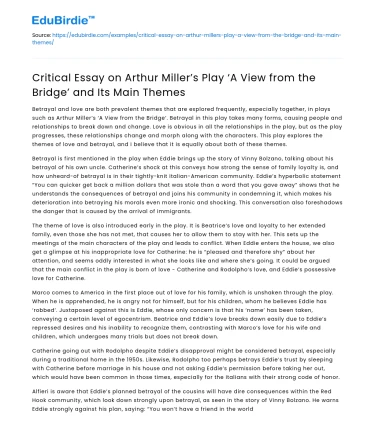Betrayal and love are both prevalent themes that are explored frequently, especially together, in plays such as Arthur Miller’s ‘A View from the Bridge’. Betrayal in this play takes many forms, causing people and relationships to break down and change. Love is obvious in all the relationships in the play, but as the play progresses, these relationships change and morph along with the characters. This play explores the themes of love and betrayal, and I believe that it is equally about both of these themes.
Betrayal is first mentioned in the play when Eddie brings up the story of Vinny Bolzano, talking about his betrayal of his own uncle. Catherine’s shock at this conveys how strong the sense of family loyalty is, and how unheard-of betrayal is in their tightly-knit Italian-American community. Eddie’s hyperbolic statement “You can quicker get back a million dollars that was stole than a word that you gave away” shows that he understands the consequences of betrayal and joins his community in condemning it, which makes his deterioration into betraying his morals even more ironic and shocking. This conversation also foreshadows the danger that is caused by the arrival of immigrants.
Save your time!
We can take care of your essay
- Proper editing and formatting
- Free revision, title page, and bibliography
- Flexible prices and money-back guarantee
The theme of love is also introduced early in the play. It is Beatrice’s love and loyalty to her extended family, even those she has not met, that causes her to allow them to stay with her. This sets up the meetings of the main characters of the play and leads to conflict. When Eddie enters the house, we also get a glimpse at his inappropriate love for Catherine: he is “pleased and therefore shy” about her attention, and seems oddly interested in what she looks like and where she’s going. It could be argued that the main conflict in the play is born of love - Catherine and Rodolpho’s love, and Eddie’s possessive love for Catherine.
Marco comes to America in the first place out of love for his family, which is unshaken through the play. When he is apprehended, he is angry not for himself, but for his children, whom he believes Eddie has ‘robbed’. Juxtaposed against this is Eddie, whose only concern is that his ‘name’ has been taken, conveying a certain level of egocentrism. Beatrice and Eddie’s love breaks down easily due to Eddie’s repressed desires and his inability to recognize them, contrasting with Marco’s love for his wife and children, which undergoes many trials but does not break down.
Catherine going out with Rodolpho despite Eddie’s disapproval might be considered betrayal, especially during a traditional home in the 1950s. Likewise, Rodolpho too perhaps betrays Eddie’s trust by sleeping with Catherine before marriage in his house and not asking Eddie’s permission before taking her out, which would have been common in those times, especially for the Italians with their strong code of honor.
Alfieri is aware that Eddie’s planned betrayal of the cousins will have dire consequences within the Red Hook community, which look down strongly upon betrayal, as seen in the story of Vinny Bolzano. He warns Eddie strongly against his plan, saying: “You won’t have a friend in the world, Eddie!”. However, he may be partly responsible for Eddie’s betrayal, given that he was the one who first suggested the idea to him. Eddie’s unnatural love and desire for his niece, Catherine, is a betrayal of his wife, and while Beatrice is aware of it on a primal level (“You want somethin’ else, Eddie, and you can never have her!”), she does not act on her knowledge beyond telling Catherine to be careful around Eddie. However, in the end, Eddie seems to regret his betrayal of her, as his last words are “My B!”. However, when Eddie drunkenly confronts the lovers, he kisses Rodolpho, whom he constantly suggests “ain’t right”, which could also be a sign of other repressed desires.
Eddie calls immigration in Act II the ultimate betrayal of the cousins. The community condemns him for betraying his family and turning his back on the Italian culture which places heavy emphasis on family honor and loyalty. Alfieri hints at an ancient distrust of the authorities in his opening speech, suggesting that it is so natural it is almost part of the culture: “Law has not been a friendly idea since the Greeks were beaten”. By siding with the authorities over his own people, he has betrayed them by breaking the unspoken code of silence that exists to protect immigrants in their tightly-knit community. His jealousy has also driven him to betray his morals. At the beginning of the play, he emphasized the importance of keeping silent, telling Catherine: “You - don’t - know - nothin’”. The use of hyphens breaks up the statement, and the threatening tone adds emphasis, making his eventual turnaround seem even more shocking.
Arthur Miller uses stage directions extensively in this play, especially to direct body language. This makes the play more immersive, making their thoughts and Eddie’s deterioration clearer. This way, his betrayal of the cousins, though shocking, Marco going after Eddie at the end of the play is a betrayal of Rodolpho and Alfieri, to whom he promised he wouldn’t, but it is staying true to his own morals. Eddie’s eventual death is caused by his own knife, symbolizing that he has betrayed himself and caused his own fall from grace.
In conclusion, Arthur Miller’s play ‘A View from the Bridge’ is just as much about betrayal as it is about love, and both betrayal and love are defining themes in this play. I fully agree with the statement.






 Stuck on your essay?
Stuck on your essay?

